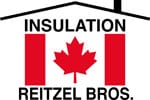Cellulose fibre maintains an almost constant R-Value over the full range of densities at which it can be installed, whereas mineral fibre products suffer dramatic losses in R-Value as the installed density decreases.
-
Call Us: 613-385-1109
Thermal Resistivity Properties of Cellulose Fibre


Cellulose fibre provides greater energy savings
Canadian homes and buildings can experience extreme temperature changes from season to season.
Wall Cavity Thermal Resistivity
Wood fibre is organic and hollow
Cellulose fibre is naturally resistant to heat loses through conduction and convection, because it is organic and it is hollow.
The organic material makes cellulose fibre a poor conducter, and the wood fibre is also hollow so it entraps air within its structure.
The product also has the unique ability to perform better under extreme cold temperature. Specifically, it has been shown that R-values can increase as much as much as 7% under extreme cold conditions whereas fibreglass can lose as much as 21% under the same conditions (ASHRAE “Handbook of Fundamentals”, BNL 50862).
Similarly, cellulose fibre’s basic R-Value is superior to mineral fibre in the colder or hotter temperature range and makes it a preferred insulation for reducing summer cooling and winter heating costs.
Cellulose fibre maintains an almost constant R-Value over the full range of densities at which it can be installed, whereas mineral fibre products suffer dramatic losses in R-Value as the installed density decreases.












